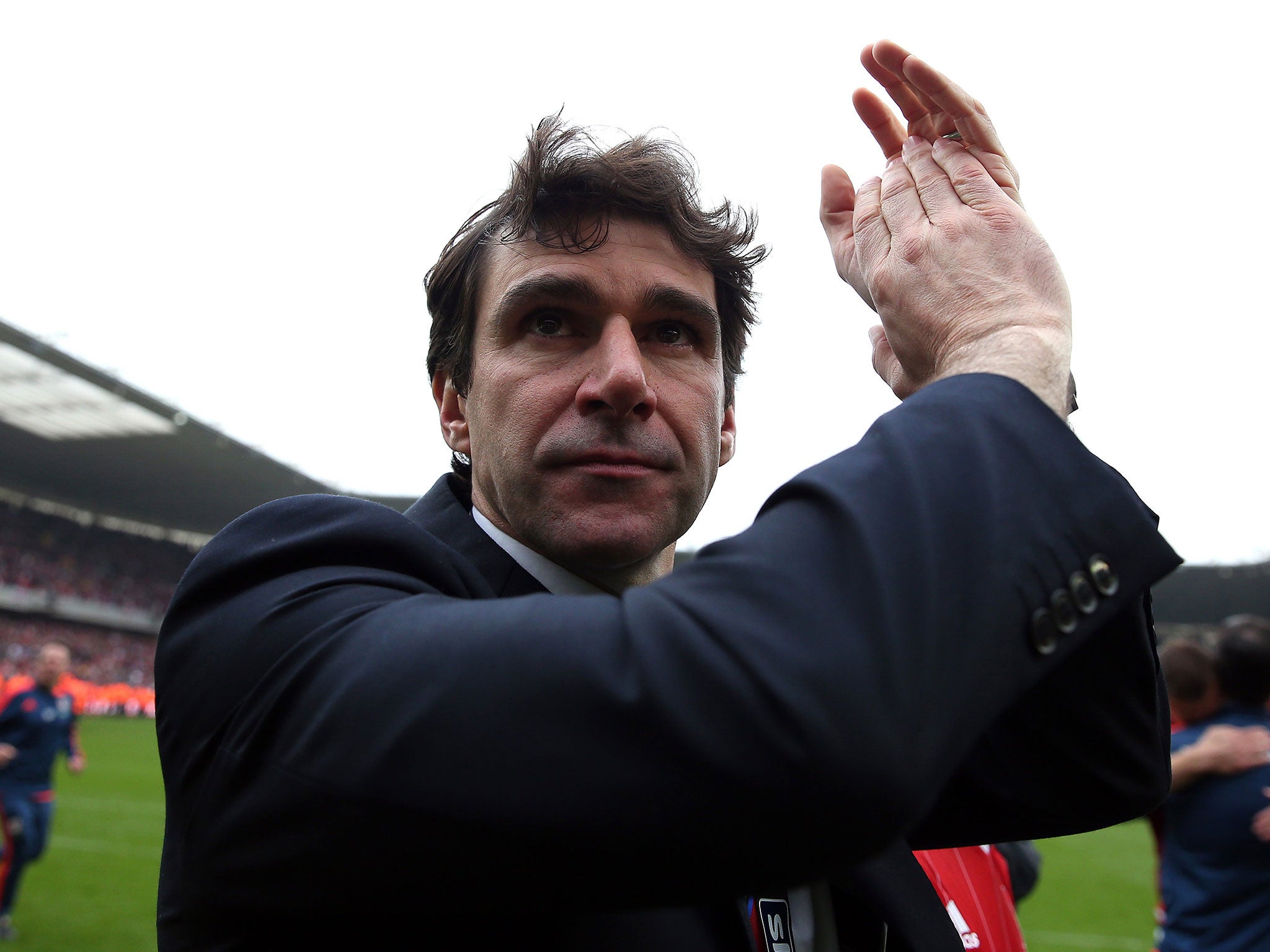Aitor Karanka the perfect man to lead Middlesbrough in Premier League, says chairman Steve Gibson
Middlesbrough chairman says the manager's future was never in doubt despite a tense season, and believes promotion to the Premier League will boost the whole city

Saturday, Middlesbrough: amid all the scenes of celebration - there was a woman in heels and full Boro kit outside Fatso’s on Corporation Road with a placard stating: ‘We are Premier League’ – the club’s benefactor/chairman Steve Gibson got to one of the bottom lines.
Middlesbrough had just secured their return to the top flight after a seven-year absence but it was after a nervy day at the end of a sometimes tense season, and only goal difference separated Boro from Brighton.
The visitors were down to 10 men for 40 minutes after Dale Stephens was dismissed. Stephens departed just four minutes after scoring Brighton’s equaliser. Cristhian Stuani had given Boro a first-half lead but they wasted chance upon chance and it was anxious.
But Boro are back and Gibson is not for changing. As it stands, Aitor Karanka will be Boro manager come August.
There has been doubt. Karanka went AWOL in March before Boro lost at soon-to-be relegated Charlton Athletic and while he returned, there has been a question mark over Karanka’s relationships with his squad and, just as importantly, with Gibson.

“I’m very pleased for the town and for the fans, I’m very pleased for Aitor,” was the first thing Gibson said in the boardroom after Boro had got the draw they needed. It felt significant that Karanka was in that opening sentence.
“That’s all credit to Aitor. If you speak to Aitor and you speak to me, we were really the two people who knew what was going on and there was no danger of Aitor leaving the club.
“He wasn’t going to leave. I didn’t want him to leave. So the outcome was easy - he was going to stay.
“We had a bump, the bump was because of all kinds of pressures and we didn’t just smooth it out, it was a catalyst and it galvanised us to move on. We’ve not lost since.”
That is true. Boro won the six games after Charlton to settle themselves. Karanka spoke about “calm” last Thursday and the “three years” left on a fresh contract signed only last August. Nevertheless it sounded ambiguous.
Gibson, however, heard otherwise. “People might have thought he was vague,” Gibson said of Karanka, “but he didn’t. He thought he was clear.”
Karanka himself talked on Saturday after an emotionally draining occasion of wanting to “cry for 24 hours”.
The Basque, former assistant to Jose Mourinho at Real Madrid, arrived on Teesside in late 2013 when the club was floundering in the Championship and thinking ominously of League One. There was a particular game – against Brighton – at the Riverside in December 2013 when a late winner for the visitors had Karanka doubting the wisdom of his first move into frontline management. “My worst moment,” he was to say. There were 13,000 at that match.
But the club recovered and there has been serious investment since. It took Boro to the play-off final last May – which they lost 2-0 to Norwich.
Yet as the club has grown, and is now around £200m richer, the area has suffered. The theme of football and geographic identity can seem sentimental, overblown – until it’s not there. Leicester City have unquestionably done something for Leicester the city. It is the same for Middlesbrough.
When Karanka was appointed Redcar steelworks had 2,200 employees and 1,000 contractors; now it’s shut.
“We all know what happened with the steelworks, but Teesside is beginning to bounce back,” Gibson said.
“There’s a lot of good things happening and hopefully promotion and this club can be a catalyst for that. It’s not doom and gloom on Teesside, there are a lot of positives here. Hopefully this is the start.”
That word hope is not to be under-rated. Gibson was not even 30 when he first helped rescue Middlesbrough in 1986 and he has remained loyal. Managers at other clubs look at him wistfully.
But a football club can be an emblem for an area, not its principal economic driver and the idea of a ‘Northern Powerhouse’ would be laughable if it wasn’t patronising.
As captain Grant Leadbitter said last week, local players such as Stewart Downing, Ben Gibson and Jonathan Woodgate bring tales of “unemployment” into the dressing room. The chairman, manager and players knows the difference they can make is about mood.
Leadbitter, who has been playing for almost two months while requiring a hernia operation, reflected that when he went back to last May at Wembley. Saturday’s referee, Mike Dean, was also in charge then.
“When Mike Dean blew the final whistle in the play-off final last year, the only emotion was of total desolation,” Leadbitter said. “But when he blew the final whistle this time we went to the other end of the spectrum.”
Leadbitter and his teammates were out in Middlesbrough yesterday celebrating, a conspicuous, visible sign of success in a place smaller than Bournemouth.
“Punching above our weight,” is a Steve Gibson phrase. Middlesbrough are back in the big fight.
Join our commenting forum
Join thought-provoking conversations, follow other Independent readers and see their replies
Comments